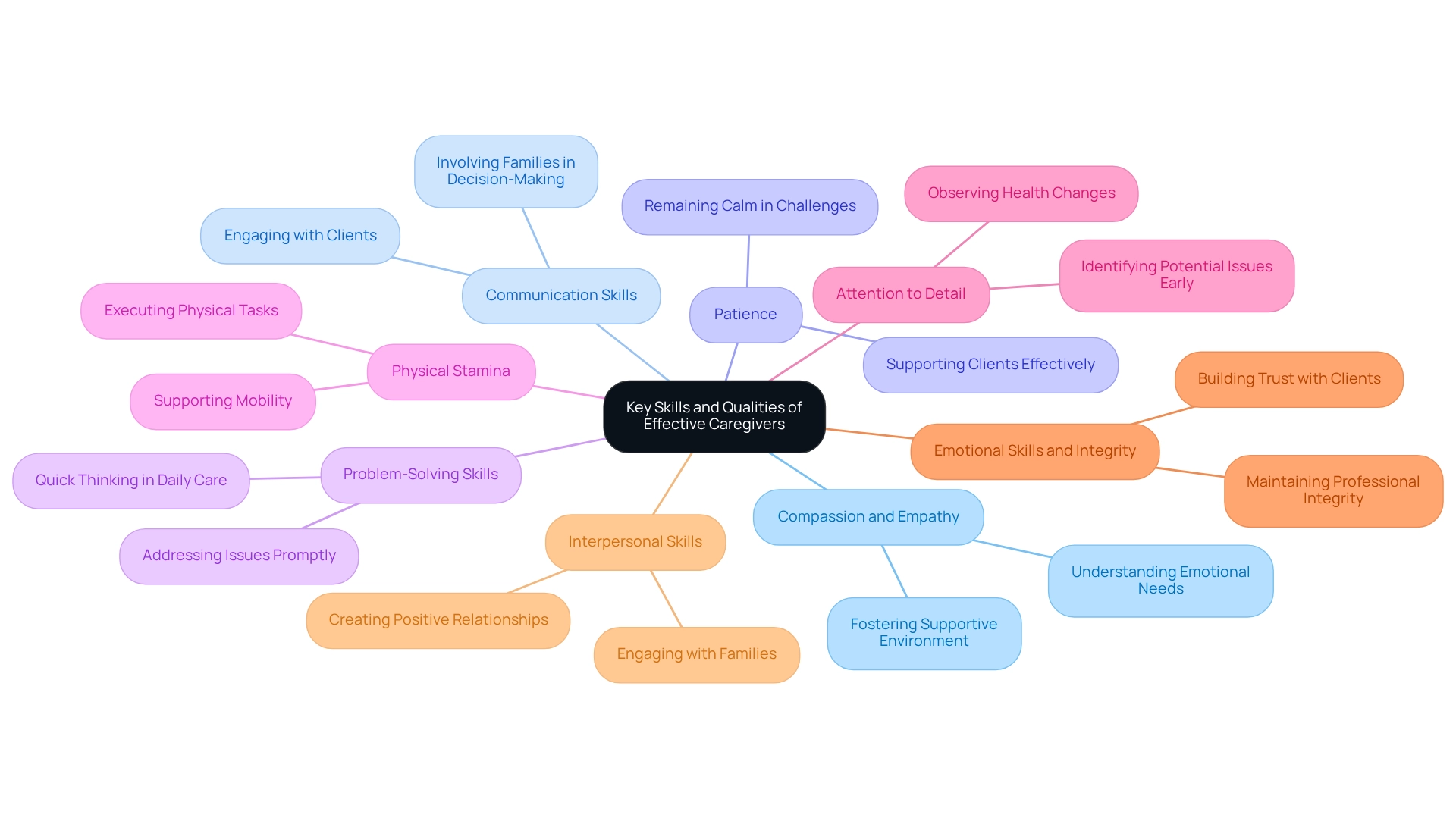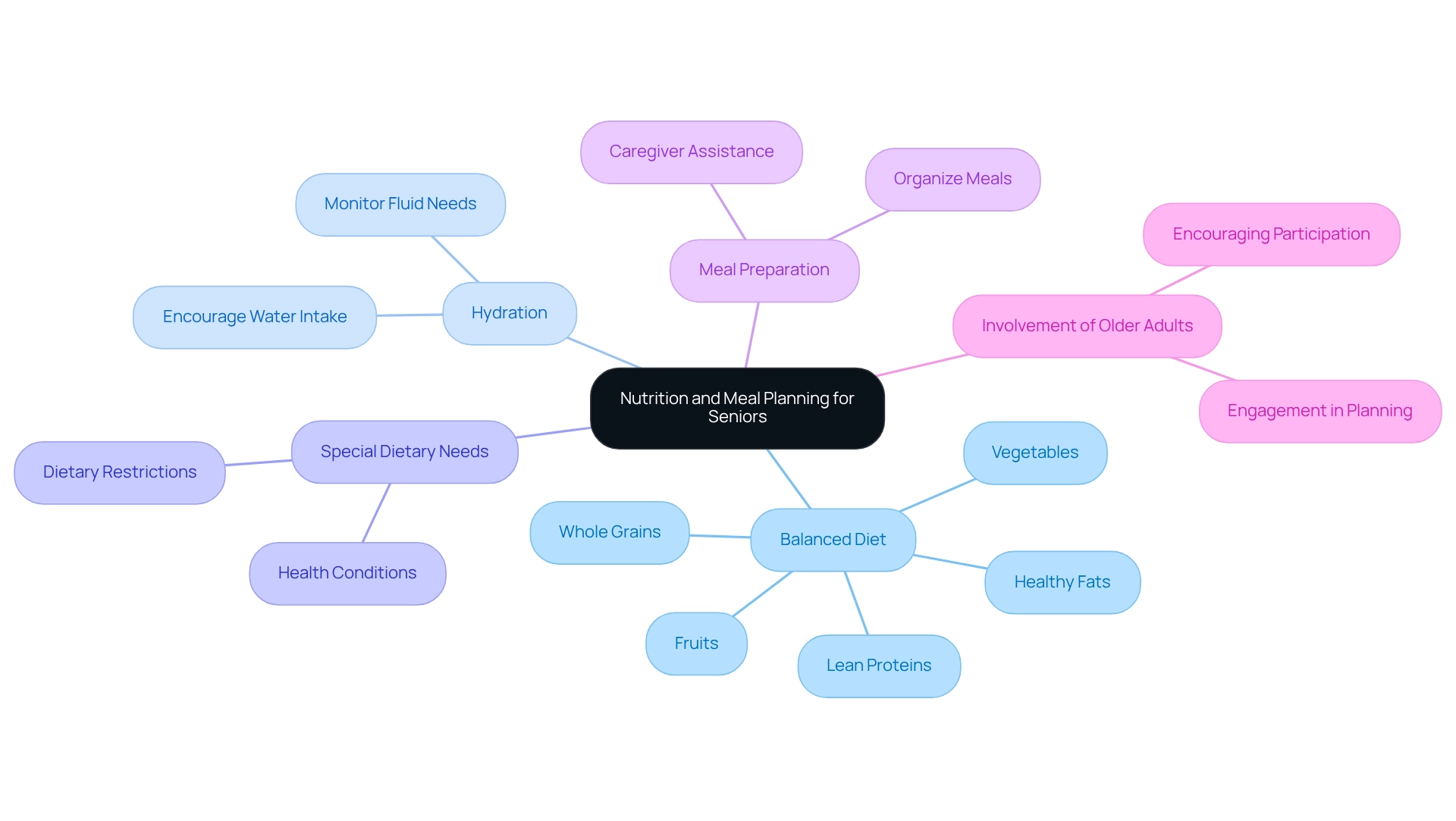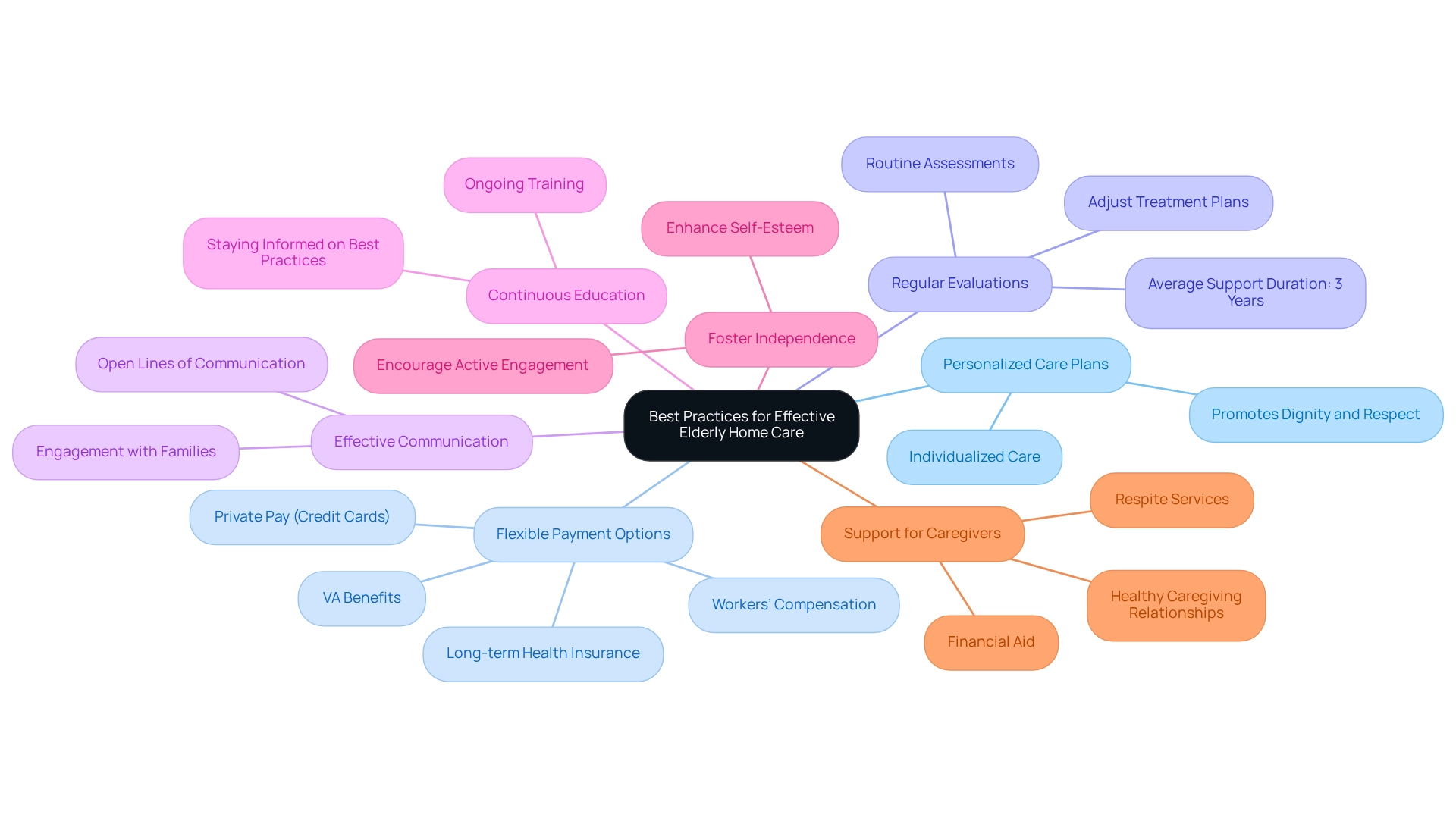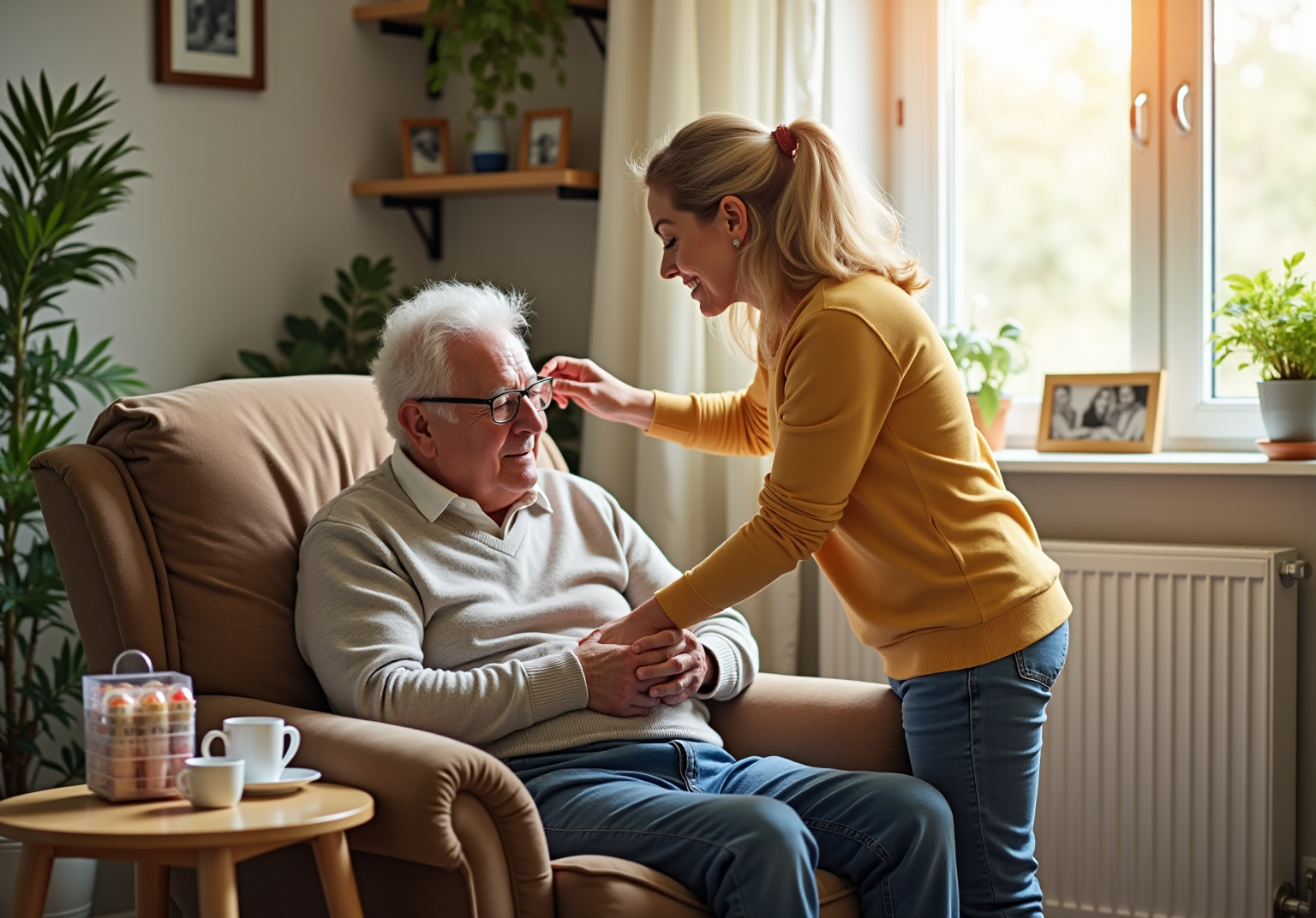Overview
Home care for the elderly is not just a service; it’s a lifeline that offers a variety of supportive options designed to help older adults maintain their independence while receiving the assistance they need. This care ultimately enhances their quality of life, allowing them to thrive in a familiar environment.
As we see a growing demand for these services, it’s important to recognize how personalized care plans, companionship, and skilled nursing play crucial roles in the emotional and physical well-being of seniors. Each element of home care is tailored to meet individual needs, fostering a sense of security and comfort.
In addition, having someone to share moments with can significantly uplift a senior’s spirit. The companionship provided through home care not only combats loneliness but also enriches their daily experiences.
We understand that choosing the right care can be overwhelming. Rest assured, we’re here for you, ready to support you in making the best decision for your loved ones. Your comfort is our priority, and we are dedicated to providing the compassionate care that every senior deserves.
Introduction
In an aging society, the significance of home care for the elderly is more pronounced than ever. This comprehensive approach not only allows individuals to maintain their independence in familiar surroundings but also addresses their unique physical, emotional, and social needs. As families increasingly recognize the benefits of personalized support, the demand for tailored home care services continues to rise, enhancing the quality of life for loved ones.
From skilled nursing and companionship to essential modifications for safety, understanding the various aspects of home care is crucial for ensuring that seniors thrive in their golden years. We believe that every senior deserves the comfort and dignity that comes with quality care.
This article delves into the importance of home care, the types of services available, and the vital role caregivers play in fostering well-being for the elderly. Together, we can make a difference in the lives of those we cherish.
Understanding Home Care for the Elderly: Definition and Importance
Home care for the elderly encompasses a wide range of supportive services delivered within the comfort of one’s home, empowering older adults to maintain their independence while receiving essential assistance. This care includes personal support, companionship, and specialized nursing services, all tailored to meet the unique needs of each individual.
The significance of home care for the elderly is evident in its ability to enhance the quality of life for older adults, allowing them to thrive in familiar surroundings. As we approach 2025, the demand for domestic assistance services continues to rise, reflecting a growing recognition of the benefits these services provide. Statistics reveal that older adults receiving home care experience improved emotional wellness and a heightened sense of independence—both crucial for their overall health.
Additionally, as of May 2023, the median annual salary for all employees was $48,060, highlighting the economic factors that influence the availability and affordability of support services.
Successful support programs, such as those offered by Best Care Nurses Registry, have demonstrated remarkable outcomes in enhancing the quality of life for elderly individuals through home care. Best Care provides a comprehensive array of services, including:
- Private Duty RNs and LPNs
- 24-Hour Assistance
- Alzheimer’s & Dementia support
- Telemedicine Setup
This commitment to customized home care is essential in helping seniors live independently while considering their physical, mental, emotional, and spiritual well-being.
The benefits of home care for elderly seniors are extensive. These services not only alleviate the pressure on family caregivers but also guarantee that loved ones receive professional attention, allowing families to focus on their own lives. Moreover, home care services are designed to be flexible, adapting to diverse needs without the constraints of lengthy contracts.
This adaptability is particularly vital in 2025, as families seek reliable and compassionate support for their elderly relatives.
In conclusion, the importance of home care for elderly individuals cannot be overstated. It fosters independence and dignity while significantly enhancing the overall well-being of older adults, making it a crucial component of health services in our society today. Best Care Nurses Registry’s esteemed reputation, built over decades as a trusted provider of personalized health services in South Florida, further reinforces the confidence families can have in their assistance.
Types of Home Care Services: Exploring Your Options
Home support services encompass a variety of essential types, each designed to cater to the unique needs of elderly individuals:
- Personal Assistance: This includes help with daily activities such as bathing, dressing, grooming, and meal preparation. It ensures that older adults maintain their dignity and independence in their own homes. At Best Care Nurses Registry, we highlight individualized assistance, pairing clients with suitable providers to deliver customized support.
- Companionship: Offering social engagement and emotional backing is essential for addressing isolation among older adults. Companionship services help foster meaningful connections, enhancing overall quality of life. The attendants at Best Support not only provide companionship but also emotional assistance, easing feelings of isolation and enhancing mental health.
- Skilled Nursing: Provided by registered nurses (RNs) or licensed practical nurses (LPNs), skilled nursing includes medical services such as medication management, wound treatment, and monitoring chronic conditions. This home care service is vital for older adults with intricate health requirements, ensuring they receive the necessary professional assistance for their well-being.
- Respite Support: This service provides temporary relief for primary caregivers, allowing them to take needed breaks while ensuring their loved ones receive ongoing support. Respite support is crucial for avoiding caregiver exhaustion and preserving family relationships, offering reassurance for relatives.
- Health Aides: These aides assist with daily living tasks and basic health oversight, ensuring that elderly individuals receive the help necessary to live comfortably in their residences. Best Care’s assistants are trained to improve the quality of life for older adults, addressing both physical and emotional requirements.
Home care for elderly individuals is not only more affordable but also more convenient than conventional hospital or nursing facility services. It allows them to receive the support they need in the comfort of their own homes. Statistics show that the demand for home care for elderly individuals, including household health and personal assistance aides, is on the rise. This trend is driven by a growing elderly population and an increasing preference for residential and community-based support services. In fact, as of 2025, approximately 70% of seniors are utilizing some form of home care services, reflecting a significant shift towards individualized support options.
Best Care Nurses Registry exemplifies the importance of personalized home care services. Our commitment to matching clients with compatible caregivers ensures that each individual receives tailored support that meets their specific needs. For instance, a case study highlighted how Best Care’s unique offerings, such as flexible scheduling and assistance with long-term insurance claims, have positioned us as the preferred choice for families in South Florida seeking exceptional health services.
By concentrating on the specific requirements of older adults, Best Care not only improves the standard of home care but also reduces the anxiety felt by families. This enables them to prioritize their personal lives while ensuring their loved ones are well looked after. If you are seeking compassionate and adaptable health services at your residence, we invite you to reach out to Best Care Nurses Registry today. Discuss your requirements and arrange a consultation. Moreover, associated sectors like Adult Day Services and Home Medical Supplies play a vital role in the wider home care environment, further emphasizing the significance of comprehensive assistance for the elderly.
Key Skills and Qualities of Effective Caregivers
Competent providers in home care for elderly individuals must embody a mix of crucial abilities and personal traits that greatly influence the quality of assistance given. These key attributes are not just beneficial; they are fundamental for building trust and rapport with clients, which is essential for effective caregiving.
- Compassion and Empathy: Caregivers should be adept at understanding and responding to the emotional needs of seniors, fostering a supportive environment that enhances their well-being.
- Communication Skills: Clear and effective communication is essential, allowing providers to engage with both elderly individuals and their families, ensuring everyone is informed and involved in decision-making.
- Patience: The ability to remain calm and supportive, particularly in challenging situations, is crucial for maintaining a positive caregiving experience.
- Problem-Solving Skills: Caregivers must be quick thinkers, capable of addressing issues that arise in daily care, ensuring that the needs of their clients are met promptly.
- Physical Stamina: Supporting mobility and physical tasks necessitates that individuals maintain a level of physical fitness that enables them to execute their responsibilities effectively.
- Attention to Detail: Observing alterations in health and well-being is essential, as those providing care play a critical role in identifying potential health issues early on.
- Emotional Skills and Integrity: Caregivers should possess strong emotional skills and integrity, which are vital for building trust and rapport with clients.
- Interpersonal Skills: Effective interpersonal skills are necessary for creating a positive relationship with clients and their families.
Studies suggest that almost half of all individuals in this role feel they have no option in assuming it, highlighting the significance of these abilities in easing the emotional and physical burden of providing care. Additionally, case studies show that home care for elderly clients, including home health and personal support aides, greatly assists in their daily living activities, improving their overall quality of life.
As noted by Phyllis Mutschler, “Research has shown, for example, that counseling and support groups, in combination with respite and other services, have positive direct effects on health behavior practices.” Training programs that emphasize compassion and empathy are essential in cultivating these abilities, ensuring support providers are well-equipped to deliver the highest standard of care. By recognizing the essential roles of CNA and HHA caregivers, families can better assess the need for home care for elderly individuals, ultimately enhancing their quality of life and independence.

Creating a Safe Home Environment for Seniors: Tips and Modifications
Creating a secure living space for older adults is essential for enhancing their well-being and independence. It’s important to consider several effective modifications:
- Improve Lighting: Ensure that all areas, especially stairways and hallways, are well-lit. Adequate lighting significantly reduces the risk of falls, which are a leading cause of injury among the elderly.
- Install Grab Bars: Strategically place grab bars in bathrooms and near stairs. These provide crucial assistance, helping elderly individuals maintain balance and stability.
- Remove Trip Hazards: Clear pathways of clutter, loose rugs, and electrical cords. A tidy environment minimizes the risk of tripping, which is vital for maintaining safety.
- Use Non-Slip Mats: Incorporate non-slip mats in areas prone to moisture, such as bathrooms and kitchens. This simple addition can greatly decrease the likelihood of slipping accidents.
- Adjust Furniture Layout: Rearrange furniture to create clear pathways that accommodate mobility aids like walkers or wheelchairs. Ensuring easy navigation throughout the residence is crucial for seniors’ safety.
- Emergency Preparedness: Make sure that emergency numbers are easily accessible and that smoke detectors are functional. Regular inspections of these safety devices can provide reassurance.
In addition to these adjustments, families should look for signs indicating the need for CNA/HHA support services. Challenges with personal hygiene, dressing, cooking, cleaning, or managing medications are key indicators. Health concerns, such as managing chronic conditions or frequent hospitalizations, also warrant consideration. Maintaining open communication with supporters and the at-home assistance organization is essential for ensuring quality care.
Regular check-ins with your loved one to discuss their experiences and any concerns, along with occasional updates from the support person, can help address issues promptly. Furthermore, families can follow three straightforward steps to obtain personalized health services with Best Care Nurses Registry:
- Call to discuss needs
- Seek a support plan from a doctor
- Select compassionate providers
By implementing these strategies and utilizing CDC resources for fall prevention, families can help ensure their loved ones remain safe and self-sufficient in their own homes.
Best Care Nurses Registry emphasizes these practices, showcasing their commitment to personalized service and flexibility in home care. This includes providing compassionate caregivers who assist with daily activities and health management, ensuring that elderly individuals receive the support they need to thrive at home.
Nutrition and Meal Planning: Supporting Healthy Eating for Seniors
Nutrition is essential to the health and well-being of older adults, profoundly influencing their overall vitality and quality of life. As we consider effective meal planning, let’s explore some essential considerations that can make a meaningful difference:
- Balanced Diet: Meals should encompass a diverse array of fruits, vegetables, whole grains, lean proteins, and healthy fats. This variety not only meets nutritional needs but also enhances the enjoyment of meals. How can we make mealtime more delightful for our loved ones?
- Hydration: Adequate fluid intake is crucial, as dehydration is a common issue among older adults. Encouraging older adults to drink water regularly can significantly enhance their health outcomes.
- Special Dietary Needs: It is vital to recognize any dietary restrictions or health conditions that may necessitate specific nutritional adjustments. Customizing meals to meet these requirements can avert complications and enhance overall health. Are we doing enough to cater to these unique needs?
- Meal Preparation: Organizing meals beforehand ensures that older adults have access to nutritious choices daily. This proactive approach can help maintain a balanced diet and reduce the likelihood of unhealthy eating habits. Home care for the elderly includes caregiver services that can assist with meal preparation, ensuring that older adults receive the nutrition they require without the stress of cooking.
- Involve Older Adults: Engaging older individuals in the meal planning and preparation process fosters a sense of independence and enjoyment in their dining experiences. This engagement can also lead to better choices and increased satisfaction with their meals. How can we encourage their participation?
Alongside these factors, we must acknowledge that modifications to living spaces and assistive tools can aid older adults in preserving their independence while addressing their nutritional needs. Engaging in moderate physical activity for at least thirty minutes per day can also complement nutritional efforts, reducing the risk of chronic disease.
As noted by Sam, a project coordinator at a nonprofit organization, the risk of falling is a significant concern for older adults. Proper nutrition and meal planning can play a crucial role in preventing falls and ensuring safety in the home environment.
Additionally, with the growing economic consequences of aging, as emphasized in recent research, focusing on nutrition and assistance for the elderly is crucial, especially given the rising healthcare expenses.
By emphasizing nutrition and employing CNA/HHA caregiver services, home care for the elderly can greatly enhance the health and well-being of older adults. Together, we can enable them to flourish in their daily activities while improving their quality of life and autonomy.

Emotional and Social Well-being: The Role of Companionship in Elderly Care
Companionship plays an essential role in supporting the emotional and social needs of older adults. Research indicates that social isolation and loneliness can have severe health implications, comparable to the effects of smoking, obesity, and physical inactivity. These factors increase the risk of heart disease, stroke, type 2 diabetes, depression, anxiety, suicidality, self-harm, dementia, and earlier mortality. Therefore, fostering companionship is crucial for enhancing the quality of life for seniors.
At Best Care Nurses Registry, we genuinely understand the importance of personalized home care services that cater to these needs, offering a cost-effective and convenient alternative to traditional care settings. Here are several effective strategies we implement to promote social interaction:
- Regular Visits: Our caregivers schedule consistent visits to help maintain vital social connections. These interactions can significantly reduce feelings of loneliness and isolation.
- Engage in Activities: We encourage older adults to participate in hobbies, games, or community events. Such activities not only stimulate social interaction but also promote mental engagement and joy.
- Provide Emotional Support: Our compassionate caregivers are available to listen and offer comfort during challenging times, making a profound difference in an elderly person’s emotional health. This support fosters trust and strengthens relationships.
- Utilize Technology: We leverage video calls and social media platforms to help elderly individuals stay connected with loved ones who may be geographically distant, bridging the gap and providing a sense of closeness.
- Encourage Group Activities: We facilitate group outings or classes that promote socialization, engaging in shared experiences that create bonds and foster a sense of community among older adults.
As Saul Levin, M.D., M.P.A., noted, “The benefits of pet ownership to many Americans seem to outweigh the stressors,” highlighting the positive impact of companionship on mental health. By prioritizing companionship in home care for the elderly, Best Care Nurses Registry caregivers can significantly enhance the emotional well-being of seniors, ultimately leading to improved mental health outcomes. Research indicates that companionship not only eases feelings of isolation but also enhances overall health, making it an essential element of support for the elderly.
Additionally, a recent poll conducted by the American Psychiatric Association revealed that 86% of pet owners reported that their pets have a mostly positive impact on their mental health, underscoring the importance of companionship in various forms.
If you are seeking compassionate support for your loved one, we invite you to reach out to Best Care Nurses Registry today at (888) 203-2529 to arrange a consultation and discuss how we can fulfill your needs.
Caregiver Challenges: Strategies for Managing Stress and Ensuring Self-Care
Caregiving can be both rewarding and challenging, often leading to significant stress for those who take on this vital role. At Best Care Nurses Registry, we recognize these challenges and provide extensive home care for elderly services designed to reduce stress for caregivers while delivering personalized support. To effectively manage caregiver stress, consider the following strategies:
- Set Boundaries: Establishing clear boundaries is essential for maintaining a healthy work-life balance. This helps individuals distinguish their caregiving duties from personal time, alleviating feelings of overwhelm.
- Seek Support: Engaging with support groups for caregivers or reaching out to family and friends can provide emotional relief and practical assistance. Best Care Nurses Registry offers adaptable respite services, enabling caregivers to take essential breaks while ensuring their loved ones receive quality assistance. Sharing experiences with others who understand the challenges fosters a sense of community and reduces isolation.
- Practice Self-Care: Prioritizing self-care is crucial. Activities that promote relaxation and well-being—such as exercise, hobbies, or meditation—can significantly enhance mental health and resilience. Research indicates that individuals who engage in regular self-care practices report lower levels of stress and improved overall health.
- Take Breaks: Scheduling regular breaks is vital to recharge and prevent burnout. With customizable support options from Best Care Nurses Registry, caregivers can enjoy peace of mind knowing that their loved ones are in capable hands during their time away.
- Communicate Openly: Open communication about feelings and challenges can alleviate emotional burdens. Sharing concerns with trusted individuals leads to practical solutions and emotional support.
By applying these approaches, caregivers can improve their resilience, allowing them to sustain quality assistance while also addressing their own health and well-being. Best Care Nurses Registry is dedicated to supporting those who provide home care for elderly individuals through personalized services that focus on safety, convenience, and emotional support for seniors and their families. We also assist clients in navigating long-term support insurance choices, ensuring they understand how to utilize their policies effectively for home care services.
A case study examining health indicators among caregivers showed that while some health aspects improved, many still faced significant challenges, emphasizing the necessity for integrated support strategies. Moreover, data indicate that 46% of healthcare professionals believe their organizations lack a clearly defined procedure for coordination, highlighting the importance of organized support systems for providers. As Sam Fazio, Ph.D., observes, “Dementia navigation programs have demonstrated they can provide significant advantages to individuals living with dementia and their supporters.”
By fostering a culture of self-care and support, caregivers can better navigate the complexities of their roles.
For additional details on how Best Care Nurses Registry can support you with long-term insurance and tailored in-home services, please reach out to us today.
Navigating Legal and Financial Aspects of Home Care for the Elderly
Navigating the legal and financial aspects of domestic assistance can feel overwhelming, but understanding key considerations can significantly ease this journey:
- Insurance Coverage: It’s important to familiarize yourself with the assistance services covered by Medicare, Medicaid, and private insurance plans. Each program has specific eligibility criteria and coverage limits, so reviewing these details is essential to maximize benefits. Notably, health coverage for working-age individuals has increased in every state from 2013 to 2023, reflecting wider trends in healthcare accessibility that may influence financial planning for senior support.
- Long-Term Support Insurance: As you explore different long-term support insurance options available in 2025, consider how this type of insurance can alleviate the financial strain of home care for elderly services. It offers peace of mind for families. Statistics show that the utilization of long-term support insurance has been consistently rising, highlighting a growing awareness of its significance in financial planning for home care. Jesse Slome, Executive Director of the American Association for Long-Term Care Insurance, emphasizes that seeking professional guidance can be invaluable in navigating these options.
- Legal Documents: Ensure that essential legal documents, such as power of attorney and advance directives, are established. These documents are crucial for making informed choices regarding medical treatment and financial issues, especially when the individual may no longer be able to express their desires. Through the Best Care Concierge Program, clients can access a network of professionals, including lawyers, financial advisors, guardians, case managers, social workers, and therapists, who can assist in these critical areas.
- Budgeting for Services: It’s wise to develop a comprehensive budget that outlines expected costs for domestic support services, including any additional expenses that may arise. This proactive approach helps families prepare for the financial responsibilities associated with caregiving. Best Care Nurses Registry, with its decades of experience and strong reputation in South Florida, provides personalized service and adaptability, including a concierge program for 24/7 nurse access, which can ease some of these complexities.
Consulting professionals, such as financial planners or elder law attorneys who specialize in navigating the intricate legal and financial issues related to home care for elderly individuals, can provide valuable insights and strategies for effective financial planning. The Best Care Concierge Program distinguishes itself by linking clients with established specialists in diverse areas, guaranteeing extensive assistance for legal and financial issues in residential health services.
By addressing these factors, families can more effectively prepare for the financial obligations of home care for elderly, ensuring that their loved ones receive the essential aid while preserving their quality of life.
Best Practices and Techniques for Effective Elderly Home Care
To ensure effective elderly home care, it is essential to adopt the following best practices:
- Personalized Care Plans: Craft individualized care plans that cater to the unique needs and preferences of each elderly individual. This method not only improves the quality of service but also promotes a sense of dignity and respect. Best Care Nurses Registry exemplifies this commitment through its tailored services, ensuring that each client receives the attention they deserve.
- Flexible Payment Options: Best Care Nurses Registry provides various payment methods, including long-term health insurance, private pay (credit cards accepted), VA benefits, and workers’ compensation. This variety simplifies access for families to the support their loved ones require without financial strain.
- Regular Evaluations: Implement routine assessments to monitor health changes and adjust treatment plans as necessary. This proactive strategy is essential, as statistics show that the average adult aged 65 and older receives long-term support services for about three years, emphasizing the need for continuous assessment.
- Effective Communication: Establish and maintain open lines of communication with seniors and their families. Keeping everyone informed and engaged is essential for ensuring that support aligns with the individual’s changing needs and preferences.
- Continuous Education: Participate in ongoing training and education to remain informed about best practices and advancements in senior support. This dedication to education enables caregivers to deliver the utmost quality of support.
- Foster Independence: Encourage seniors to actively engage in their support and daily activities. Promoting autonomy not only enhances self-esteem but also contributes to a higher quality of life.
- Support for Caregivers: Acknowledge the significance of support measures, including respite services and financial aid, to sustain healthy caregiving relationships. As Mary McDonald Winners, a gerontologist, states, “Long-term assistance is support for an individual that helps with grooming, bathing, dressing, eating, and other tasks throughout the day.”
By adopting these best practices, caregivers can greatly enhance the standard of home care for elderly individuals, ensuring that their unique needs are addressed with compassion and professionalism. Best Care Nurses Registry is dedicated to providing comprehensive support and personalized care solutions, enhancing the quality of life and independence for seniors.
For more information or to schedule a consultation, please contact us at (888) 203-2529.

Conclusion
Home care for the elderly is essential for enhancing quality of life and promoting independence. This article has highlighted various services, including personal care, companionship, skilled nursing, and respite care, all thoughtfully tailored to meet the unique needs of seniors.
Caregivers play a crucial role in this support system, bringing compassion and effective communication to their responsibilities. Their ability to foster connections significantly enhances seniors’ emotional health, helping to combat feelings of loneliness and isolation. Furthermore, creating a safe home environment and ensuring proper nutrition are vital for overall well-being.
Understanding the legal and financial aspects of home care is important for families. Familiarity with insurance coverage, long-term care options, and essential legal documents can help alleviate the burdens of caregiving. Best Care Nurses Registry exemplifies personalized service, offering flexible solutions designed to meet the specific needs of families and their loved ones.
In conclusion, home care represents a comprehensive approach that prioritizes the dignity and well-being of seniors, ensuring they receive the compassionate support they deserve. By recognizing the significance of home care services and the vital role of caregivers, families can make informed decisions that enhance the lives of their elderly loved ones, fostering an environment where they can truly thrive.
Frequently Asked Questions
What is home care for the elderly?
Home care for the elderly encompasses a wide range of supportive services delivered within the comfort of one’s home, including personal support, companionship, and specialized nursing services, all tailored to meet the unique needs of each individual.
Why is home care important for elderly individuals?
Home care enhances the quality of life for older adults, allowing them to thrive in familiar surroundings. It improves emotional wellness and independence, which are crucial for their overall health.
What types of services are included in home care for the elderly?
Home care services include personal assistance, companionship, skilled nursing, respite support, and health aides, each designed to cater to the unique needs of elderly individuals.
How does home care benefit family caregivers?
Home care services alleviate the pressure on family caregivers by ensuring that their loved ones receive professional attention, allowing families to focus on their own lives.
What are the economic factors influencing home care services?
As of May 2023, the median annual salary for employees was $48,060, which highlights the economic factors that influence the availability and affordability of support services.
How does Best Care Nurses Registry contribute to home care?
Best Care Nurses Registry provides a comprehensive array of services, including private duty RNs and LPNs, 24-hour assistance, Alzheimer’s and dementia support, and telemedicine setup, all aimed at enhancing the quality of life for elderly individuals.
What trends are anticipated in home care services by 2025?
By 2025, approximately 70% of seniors are expected to utilize some form of home care services, reflecting a significant shift towards individualized support options due to a growing elderly population.
What qualities should caregivers possess in home care for the elderly?
Caregivers should have compassion and empathy, communication skills, patience, problem-solving abilities, physical stamina, attention to detail, emotional skills, and strong interpersonal skills to provide effective care.
How does home care compare to traditional nursing facilities?
Home care is generally more affordable and convenient than traditional hospital or nursing facility services, allowing elderly individuals to receive support in the comfort of their own homes.











